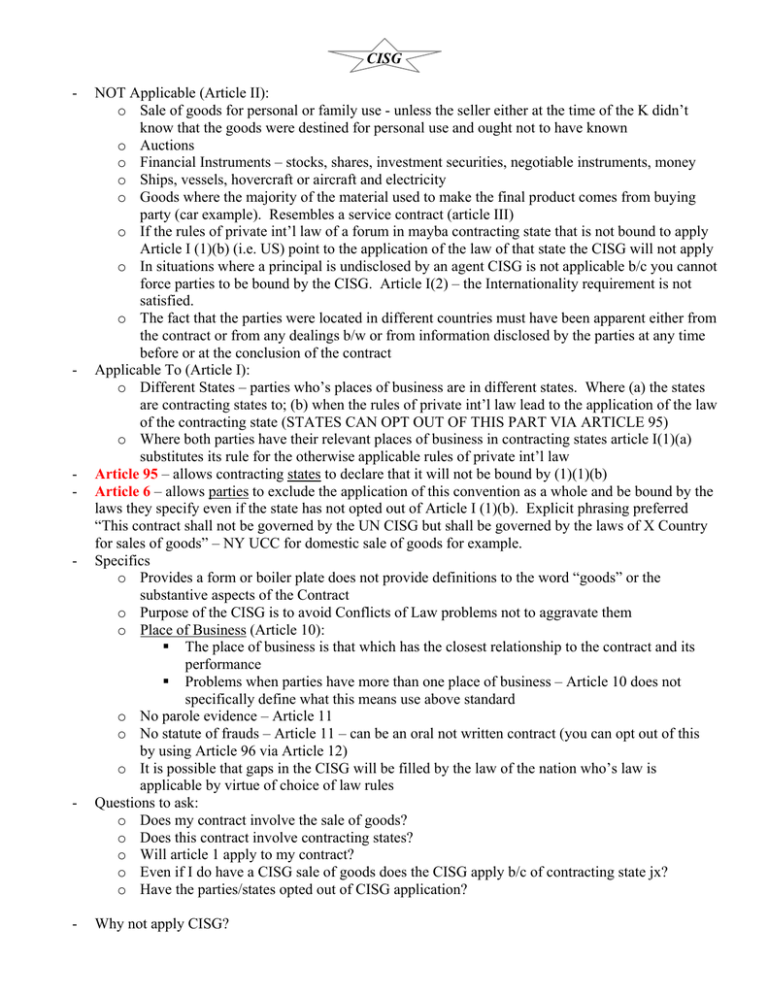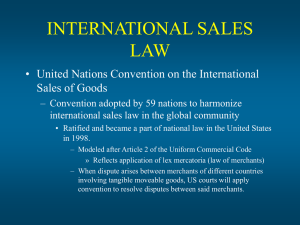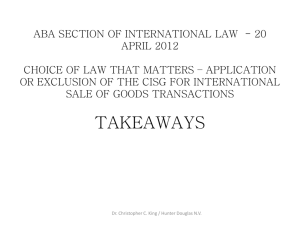CISG - NOT Applicable (Article II):
advertisement

CISG - - - - - - NOT Applicable (Article II): o Sale of goods for personal or family use - unless the seller either at the time of the K didn’t know that the goods were destined for personal use and ought not to have known o Auctions o Financial Instruments – stocks, shares, investment securities, negotiable instruments, money o Ships, vessels, hovercraft or aircraft and electricity o Goods where the majority of the material used to make the final product comes from buying party (car example). Resembles a service contract (article III) o If the rules of private int’l law of a forum in mayba contracting state that is not bound to apply Article I (1)(b) (i.e. US) point to the application of the law of that state the CISG will not apply o In situations where a principal is undisclosed by an agent CISG is not applicable b/c you cannot force parties to be bound by the CISG. Article I(2) – the Internationality requirement is not satisfied. o The fact that the parties were located in different countries must have been apparent either from the contract or from any dealings b/w or from information disclosed by the parties at any time before or at the conclusion of the contract Applicable To (Article I): o Different States – parties who’s places of business are in different states. Where (a) the states are contracting states to; (b) when the rules of private int’l law lead to the application of the law of the contracting state (STATES CAN OPT OUT OF THIS PART VIA ARTICLE 95) o Where both parties have their relevant places of business in contracting states article I(1)(a) substitutes its rule for the otherwise applicable rules of private int’l law Article 95 – allows contracting states to declare that it will not be bound by (1)(1)(b) Article 6 – allows parties to exclude the application of this convention as a whole and be bound by the laws they specify even if the state has not opted out of Article I (1)(b). Explicit phrasing preferred “This contract shall not be governed by the UN CISG but shall be governed by the laws of X Country for sales of goods” – NY UCC for domestic sale of goods for example. Specifics o Provides a form or boiler plate does not provide definitions to the word “goods” or the substantive aspects of the Contract o Purpose of the CISG is to avoid Conflicts of Law problems not to aggravate them o Place of Business (Article 10): The place of business is that which has the closest relationship to the contract and its performance Problems when parties have more than one place of business – Article 10 does not specifically define what this means use above standard o No parole evidence – Article 11 o No statute of frauds – Article 11 – can be an oral not written contract (you can opt out of this by using Article 96 via Article 12) o It is possible that gaps in the CISG will be filled by the law of the nation who’s law is applicable by virtue of choice of law rules Questions to ask: o Does my contract involve the sale of goods? o Does this contract involve contracting states? o Will article 1 apply to my contract? o Even if I do have a CISG sale of goods does the CISG apply b/c of contracting state jx? o Have the parties/states opted out of CISG application? Why not apply CISG? o Conceptual differences b/w applicable law and CISG (personal preferences) o Relative case law surrounding CISG – ability to predict outcome of litigation o Many ppl are unfamiliar with CISG Letters of Credit - Players o Seller – wants money for goods produced/purchased o Buyer – concerned with the documents and wants a 3 things that can be assured through the documentation presented by the Seller Quality Quantity Title o Bank – acts as an intermediary b/w the two parties to minimize the mistrust factor. Basically serves an escrow function established by Buyer to benefit Seller Issuing Bank – issues L/C to Seller • Can also act as a Lender to the Buyer if the Buyer is unable to front the money at the time the L/C is drafted via a separate debt transaction – bank advances funds to Buyer • L/C joined with lending transaction with bank – Seller is not involved or affected by this transaction • Bank is on the line regardless of whether or not lending transaction fails Paying Bank – Pays amount due on the L/C upon presentation of documents required as per L/C agreement Advising Bank – informs Seller that another bank has issued an L/C - Types of L/C o Straight Irrevocable (not to be confused w/Stand-by or Back-to-Back) – a definite commitment by the IB to pay provided the beneficiary complies with the terms and conditions in the L/C. Once the party has performed by providing the necessary documentation the bank must facilitate the payment o Revocable – may be amended or cancelled by the issuing bank at any time without prior notice to the beneficiary. Can’t be depended on for a financial protection b/c it can be revoked – defeats the purpose Seller seeks in demanding the L/C o Stand-by – provides extra security to any other L/C. You want to get one when ever you want a guarantee from another party o Back-to-Back – needed where Buyer acts as the Seller and the Buyer in two separate transactions. Done for purposes of protecting the importer not in the sense of payment but in the sense of not getting stuck with the goods - Provisions Necessary o Name of the Parties Involved in transactions o Amount to be transferred o Expiration of L/C o Latest Shipping Date o Necessary Documentation to Claim Funds Negotiable bill of lading Commercial Invoice - Quantity, Price, Quality Export License and payment of Taxes – prevent the seizure of the goods by Customs Proper Title Policy of Marine Insurance Certificate of Inspection – expert inspection Service Agreement - Fees & Payments Taxes Interests (late fees) Force Majeure (Change in Political Structure or Natural Disasters) Breach of Contract Payment (non-completion of work) Variations Clause (modify what is in K to the change in field) Schedule of Services – Addendum to actual K which lays out all specs regarding services provided – make sure clause is reasonably specific – (“reasonable efforts” is not ok – too much room for judicial interpretation Time frame Cancellation Scheme – “good cause” or “at will” - You are trying to define reasonableness – in FM, BofK, Cxlation, and Variations clauses - Questions to Ask 1. What are the parameters of K? 2. Duration of K? 3. Location problems? 4. How is liability divided? Boiler Plates 1. Force Majeure 2. Conflict of Laws 3. Choice of Forum 4. Arbitration Clause 5. Legal fees 6. Severability of Clauses 7. No Parole Evidence Debt Transaction Basics – Bilateral 1. Interests – oppt’y cost of “renting” money → risk of losing + not being able to use it (inflation factored into it) a. Risk of Loss b. Time Value of $ 2. Body of Law – Promissory Note takes you out of standard contract law & into Debtor-Creditor Law a. Special Remedies to Creditor under K law b. Makes sure your assets don’t disappear 3. Moral Hazard – problem w/lending money is that there may be no obligation to use the money in the way borrower originally intended a. Fix: ALTER INCENTIVES – Lender Protection i. Remove floor in Bankruptcy ii. “Where as” Clause – K away by creating an obligation 4. Loan a. “Where as” b. Definitions c. Actual Details i. Loaned Amount ii. Interest rates & how its calculated iii. Repayment terms iv. Timing v. *Taxes – VIP for lender b/c lender doesn’t want to pay taxes 5. Article III – Conditions Precedent a. Nat’l Bank Approval b. Conditions Precedent c. Representations & Warranties (definition) d. Proceedings (like variance in service agreement) 6. Article IV – Rep. & Warr. a. *Pari Passu – no subjugation b. Existence & Power – valid corp. under jx law c. Delivery of Financial Information – regarding debt/solvency d. *Use of Proceeds – stops Moral Hazard – you can require a business plan and stipulate that loan must be used to further plan e. Title to Properties – i. borrower has good title to assets ii. free of liens iii. can be excepted out by making it known to the lender f. Full Disclosure – anything that adversely affects lender’s/borrower’s interest 7. Article V – Affirmative Covenants a. Do things right, maintain records b. CYA 8. Article VI – Negative Covenants (I will not) a. No change in nature of business or ops b. No future debt c. No liens on property d. No merger w/out notice 9. Article VII – Events of Default a. Failure to pay (easiest) b. Fail to comply w/covenants c. False R&W d. *Force Majeure Clause – accounts for natural disasters & changes that make K no longer feasible 10. Article VIII – Miscellaneous a. Choice of Law b. Severability c. Headings d. Consent to Jx e. Waiver of Rights (waiver of service of process) f. Service of Process g. Arbitration h. Language Clause i. Currency Exchange – dollars v. euros Revolving Credit (Debt Transaction) Definition: Contractual agreement b/w a bank & its customer whereby the bank agrees to make loans up to a specified maximum for a specified period as the borrower pays the loan, an amount equal to the repayment can be borrowed again under terms of the agreement - * account has interest and a bank fee for commitment to hold the funds available - Availability Period – b/w starting date & expiration date Charged interest rate on amount used not amount borrowed LIBOR or US Primary Conducts Precedent R&W Events of Default Swingline (Debt Transaction) - - - Used at the beginning of project & until project starts to generate Recommend by financial advisers at beginning project Revolving credit line + long term debt Swingline – short term debt o High Interest rate b/c it is more expensive for bank to have funds setting there waiting o Works like CC o You can prepay o You don’t want by balances Long Term: (Eurodollars Account) o Low interest rate – b/c $ is borrowed on Capital Market for fixed time at a fixed interest rate & lend back to borrower also at a fixed rate & fixed time – Bank as Double-Agent o No Prepayment or prepayment w/penalty – idea is that bank borrowed at a fixed amount & has to pay interest penalty so you should too – mirror contractual stipulating How Short & Long Term work together o Each credit line addresses a specific need the project has o You start in one credit area & move it to the other You need this when you need to convert the funds borrowed at higher interest to a line that costs less money *The transfer costs money so you use this when it is efficient & when you have by chunks of $ to transfer - Not good for small chunks Guarantor Problem Definition: risk that a foreign gov’t will default on its loan or fail to honor other business commitments b/c of a change in national policy. A country asserting its prerogatives as an independent nation might prevent the repatriation of a company or a country’s funds through limits on the flow of capital, tax impediments, or the nationalization of property. Sovereign risk became a factor in the growth of international debt that followed the oil price increases of the 1970s. Several developing countries that borrowed heavily from Western banks to finance trade deficits had difficulty later keeping to repayment schedules. Banks had to reschedule loans to such countries as Mexico and Argentina to keep them from defaulting. These loans ran the further risk of renunciation by political leaders, which also would have affected loans to private companies that had been guaranteed by previous gov’ts. Beginning in the 1970s, banks and other multinational corps developed sophisticated analytical tools to measure sovereign risk before committing to lend, invest, or begin operating in a given foreign country. Throughout periods or worldwide economic volatility, the US has been able to attract foreign investment b/c of its perceived lack of sovereign risk. Business Planning - Questions For Purposes of Final - o What is each party’s goal? o What are each party’s “must haves”? o Are there “deal breakers”? o What are the aspects of the deal that the parties will compromise on? Identify these and determine what loan is most favorable to each party IBT bag of tricks o What is financial structure How will you finance your project L/Cs Stand-by Swingline J/V Leases - No transfer of title Pay for use of “thing” not for title – title never passes from lessor to lessee 3 Types 1. Capital Leasing – lessee takes all economic attribute but no title used for int’l taxes (i.e. usually bldg) 2. Financial Leasing – lessor service is limited to financing equipment. All maintenance responsible are borne by lessee – No Title but Rent to Own 3. Operating Lease – use of equipment is only thing that lessee has – no economic interest – lessor still has to maintain equipment Franchising - Not a question of “buying the stuff.” Franchising agreement offers the franchisee 2 things: 1. Brand Name & everything associated w/it; 2. Intellectual Capital – i.e. Marriott Systems Standards Manual - No need to reinvent to wheel – all you need to do is implement the standards & practices Look to agreement for specs: o May require investor to be the active manager to maintain quality & interest – so that franchise name banc is protected o Idea is that if franchisee is a passive investor then interest will no be sufficiently aligned w/franchise ideal o Governing laws of franchise agreement – look to K law - Franchise Problems - o Usually most concrete part of the deal is the actual franchising agreement. The more complicated part is HOW the franchisee funds the project OUTSIDE the contract Building, land, etc Look at constituent parts • May require looking to IBT bag o’ tricks o LCs o Stand-bys o Loan Agreements o Leasing o Servicing Joint Ventures - - What is a JV? o Involves a more limited business purpose than a partnership - generally for a single transaction – can be used for a franchise o For a JV the parties are bound together for a period of time (i.e. until the specific project has gotten off the ground) o Limited Purpose + Business Association – let’s form an LLC for the purpose of funding the building of a hotel o JVs contracts are similar to a marriage prenuptial agreement in the sense that they structure the venture including the exit strategy making the relationship stable, attempting to eliminate uncertainty. o Structured by a set of legal agreement of varying degree o Important to determine those aspects of the deal that parties are willing to compromise o Important aspect of JV is that both parties bring something to the table (i.e. A brings Land and B brings money and local contacts – IP) – list the things that they are bringing to the JV in the contract What goes into a JV contract? o Formal Contract - Special contract sets forth all the terms of the deal AND the factors that are fundamentally involved with the business association o Object & Scope – outlines the business purpose (preamble) o Formation of JV Capitalization – who brings how much Limited liability – neither party will be individually liable for the debts or obligations of the JV except to the extent of their contributions of equity (capitalization) Powers of the JV (forming a BA) - describes the type of venture they would be involved in as well as how the JV will be managed and who will do it (aspects of business management – formation of business association – BOD, stock, voting power) Management – who does what (BOD and majority/minority voters, appt power) Profits and Distributions – when they take place and who gets what, may choose to make it proportional to equity contribution o Trademark, Markings, Quality Control and Sales Grants – one company grants to JV the right to use trademarks in connection with the products that come out with the JV but those TR remain the property of the grantor Quality Control – it is the prerogative of the grantor to decide whether the production material and products produce by the JV meet the quality standards that were set out by the grantor (G has more to lose) o Termination & Liquidation - Exit Strategies Duration – X amount of years (renewable?) Termination & Dissolution – BOD may decide at any time to terminate and liquidate venture at any time b/c it is unable to continue profitable operations due to reasons of force majeure; unable to carry out the purposes for which it was created; unable to carry out operations due to heavy losses Termination by either Party – (1) written notice; (2) pay termination fees due to nonterminating party; (3) liquidation of assets in accordance with contribution Expiration of Licenses – upon termination of the JV all licenses, including rights and licenses and trademarks and “know-how” revert to the original grantor; all written material, data and info relating to trademark shall either be returned to owner or destroyed o General Provisions: - Inventions and designs and know how which are furnished to JV are proprietary and confidential and may only be used by JVers provided by the agreement Confidentiality (General Provisions)– no sharing of info outside JV or disclosure of information for anything outside purposes of JV. Confidentiality survives termination and liquidation Force Majeure Covenants that specifically state that this JV needs to be kept separate from different businesses which either party may be involved in IP Provisions – usually mixed in with the “general provisions of confidentiality” and “termination” portions What are the most important aspects attys need to consider in formulating a JV in a different country? o JV create associations governed by contract law. If joint venturers simply formed a business association they would be governed by corporate law and the articles of incorporation. o Choice of law and jx comes into play and complicates things but the contract can address this issue. If you have to sue on the articles of incorp you will have to sue in local court, under business association law, where there is a realm of uncertainty. o JVs takes a general BA and puts it into a contract and get a more certain outcome in litigation o Bottom Line: o Quality control – draft the contract in a manner that protects the quality of the end product or the product of the franchise o Never assume that the JV’s local counterpart can handle it – for purposes of due diligence you should go through a mile-long check list. o You want to be thorough - even if you are not dealing with certain areas, you want to ask your counterpart whether there are areas you haven’t accounted for - Another critical reason to ask whether you as an atty have failed to cover something is that some local ppl tend to ignore certain laws. This scenario presents an ethical problem. - How do you treat a law that no one else adheres to? • Do you continue to ignore it; or • Do you adhere to it b/c it is on the books and try to be completely transparent o Mind - Foreign corrupt practices act o Can flag the authorities attention to the issue but this mostly certainly will lead to then asking for a bribe. o Or account for it o Feasibility study – feasibility of the project is settled before the signing of the JV contract o Contracting Risk Away - The only way to deal with risk is to have very specified clauses in the contract – fixing uncertainty through contract law – o An emerging norm in JV markets is that the “outside” party will not be able to control a majority of the new BA but be the equivalent of a minority shareholder o The only way the minority party will be able to protect itself is by putting clauses into the contract that allow for control of the BA and quality control into the JV agreement making the arrangement more equitable o A JV question will almost always deal with you being the atty for the outside parties – - Questions • How are they protected? • How will they be able to exit? • How do you maintain quality control under circumstances where you do not control the standard through the corp entity? • How do you get out of the contract? o If you are an atty for the JV how will you go about setting up a manufacturing plant Plant • real estate • building – build ourselves • permits – take into account zoning Equipment • Transportation • Importation licenses • Permits Staff – LABOR LAWS • Labor laws – payroll taxes, social security, overtime payments, holiday schedules Environmental Impact • Do you have to file an environmental impact report Taxes • VAT, income, etc Insurance







